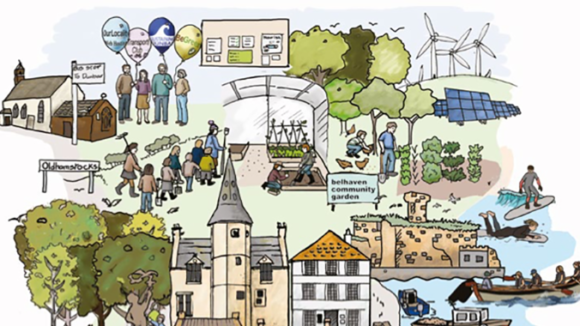
Originally written for and posted at Architecture & Design Scotland ‘s blog
To Introduce Architecture and Design Scotland’s Climate Action Towns work we reached out to a number of partners across Scotland to write a blog post on how Scotland’s Towns can work to address Climate change.
Here Philip Revell of Scottish Communities Climate Action Network outlines why he believes the future will be local.
We should never underestimate the impact that small actions can have, nor how quickly new ideas can ripple through well connected communities. An obsession with bigness, with standardisation, centralisation and hierarchy is characteristic of an outdated, fossil-fuel mindset. By its nature, renewable energy is diffuse and dispersed. Our renewables powered future can be local and human scale – but with a global perspective. It will emerge from the invisible threads that bind us together in our places and communities and which are vital for our sense of belonging and wellbeing.
In the aftermath of Covid, we have a real opportunity to join up agendas and come together to reimagine the future society we want to create. Tackling inequality and disadvantage can go hand in hand with creating resilient, zero-carbon communities – communities that are home to thriving people, where nature flourishes, and where we live, work and play in ways that respect the wellbeing of all people and the whole planet.
Community Wellbeing
Back in 2014, Scottish Community Climate Action Network members distilled a vision of the sort of re-localised future they were aiming for that is equally valid today. This is a vision for a just and equitable Scotland which recognises that our individual wellbeing is intimately connected with community wellbeing.
Seven years on, we have plenty of examples of how elements of this vision are being realised in different communities across Scotland. We have a good understanding of what basic infrastructure each community needs in order for local wellbeing economies to emerge. We don’t need to keep reinventing the wheel but we do need to remove barriers to local action, ensure that communities have access to the resources that they need and are able to tap into local knowledge and collective intelligence to develop the detail of, and implement, local solutions appropriate for their particular context.
It is no exaggeration to say that the next ten years are going to be crucial for the future of humanity. Given our early industrialisation and history of empire, can we embrace and be upfront and honest about Scotland’s particular legacy and culpability for the climate and nature emergency and the plight of the global south? Can we show the way and rapidly bring about a radical transformation of our whole economic system? Can we create a wellbeing economy focussed on enabling everybody to thrive in a flourishing environment, in Scotland and globally?
Strong and consistent leadership at all levels, including government, will be essential. But this needs to be leadership that is about trusting, supporting, enabling and facilitating. None of us have been here before. None of us has ‘the answer’, we need to be able to tap into everybody’s collective intelligence and local knowledge and to empower everyone to play whatever small part they can. We will need to learn to become comfortable with uncertainty and complexity, with trying stuff out and with making mistakes.
Agile community initiatives
Covid demonstrated how small scale, community initiatives can spring up rapidly and have the agility, local knowledge and connections to quickly innovate solutions to meet local needs. In the same way, the new wellbeing economy can be built from the bottom up. At a small scale, new ideas and approaches can be quickly prototyped and refined. Through networking, such approaches can then be picked up, adapted and replicated to bring about rapid transformation of larger scale systems that may have appeared unchangeable.
There is a real danger of a sense of powerlessness in the face of the existential threat posed by the climate and nature emergency. But, there is also an opportunity for the enormity and inevitability of change to become an exciting motivator for collective endeavour. Either way, building individual and community resilience, learning to look after ourselves and the wellbeing of those around us is becoming more vital than ever.
Philip Revell
Scottish Communities Climate Action Network
Updated August 2021
Illustration: A cropped illustration of suggested climate adaptations for a Scottish town.
